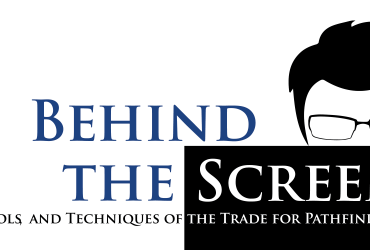Welcome to Guidance, Private Sanctuary’s source for tips and techniques for the Pathfinder Roleplaying Game, written by Everyman Gamer Alexander Augunas. Today, I’m going to be giving my thoughts about the potential for a new edition of the Pathfinder RPG.
Last week on Guidance, I talked a bit about why I don’t think a second edition of Pathfinder will drastically change the rules system away from the 3.5 Engine. As promised, this week I’m going to give my thoughts on what a theoretical “Pathfinder 2.0” might look like.
Like last week, I want to make one thing perfectly clear—despite being a Paizo freelancer I will never know know anything about their release schedule beyond whatever it is I’m working on for Paizo, and I can assure you that I would NOT be writing this article if I was working on Pathfinder 2E or had any intimate knowledge on the subject whatsoever. (Yes, not even to double cross my dear readers.) I will say, however, that as someone who is pretty involved in the RPG industry I do have some insight in regards to sales and other factors that Paizo would consider when deciding when the time is right to print P2E and what sort of content would be in P2E. As a result, there’s no wild speculation in this article—its all 100% educated guessing!
Now, let’s get started.
Assertion #1 — Pathfinder 2.0 Will Take After Unchained
To a certain extent, we’ve already seen how Paizo would handle an edition change—Pathfinder RPG: Pathfinder Unchained. This book is basically a massive codex of alternate rules and rewrites of various 3.5 systems, and the title literally references, “unchaining” Pathfinder from its predecessor, D&D 3.5.
Yet for everything that changed, all of Pathfinder Unchained’s rules follow the same generic guidelines as the Core pathfinder content. Although you might need some minor rewrites of various monsters and may need to slightly tweak certain classes, Pathfinder Unchained does not invalidate any aspect of the established rules, and I believe that such methodology is crucial in designing the next edition of Pathfinder, whenever it may be.
So, how would a theoretical “Pathfinder 2.0” be different? Well, for starters I believe that the core product would be called the Pathfinder RPG: Core Rulebook 2.0, or something like that. The title would directly reference that the new product is designed to override the original product. It would include all of the base classes from the Pathfinder RPG Core Rulebook, keeping all of the classes that don’t need changes the same while providing “unchained” versions of those that do. I would expect the unchained barbarian, rogue, and monk to be reprinted, and would hope for newly remastered versions of the cleric and fighter, with tweaks made to all classes as necessary. I would also expect a single, unified simplification of combat as well as how things are presented in the book. (For example, there is no reason for the “what happens when I can’t see,” rules to be spread out across multiple Core Rulebook chapters.) I would also expect tweaks and changes to things like individual spells and feats, magic items, and more. In all, a theoretical Core Rulebook 2.0 would be designed so you could look at an old stat block, see a feat or a spell from the Core Rulebook and be able to say, “Oh, I’ll just reference the new version of this instead of the old one,” and you wouldn’t need a huge number of changes. In this way, a new Pathfinder CRB could basically “phase out” the old one without rendering anything in that original book completely obsolete, similar to how the unchained rogue and unchained barbrian updated most of the original rage powers and rogue talents with new effects tied to the classic names.
That being said, I don’t think everything in the CRB will be tightened-up versions of classic content. I think we’re going to get new content, content that will be heavily playtested before its release. I’m not just talking about an open playtest, however, I’m talking about testing as a finished product. That product, of course, is Starfinder.
Assertion #2 — Starfinder Will Have Pathfinder 2.0 Elements
Its hard to make predictions supporting this assertion because Starfinder itself hasn’t been released yet, but historically speaking RPG companies often test new ideas for their flagship line in their newer ventures. An excellent example of this is 3.5 Edition’s Star Wars Saga, which includes mechanics that are EXTREMELY familiar to the hard-core 3.5 player. But in addition to those classic mechanics, SWS tried a lot of new things, and those new ideas were immensely popular with the 3.5 fanbase. So popular, in fact, that many were sure that 3.5 was going to uplift most of the newer innovations into 4th Edition, and the fact that Wizards of the Coast didn’t borrow from their Star Wars Saga game directly was a large wedge that helped create the edition rift that ultimately spawned Pathfinder in the first place.
The parallels between Star Wars Saga and Starfinder are uncanny when viewed in this light. The big two? Both are high fantasy science fiction games based upon an existing property (Star Wards for SWS, Pathfinder for Starfinder), and both include a drastic redesign of the older game’s mechanics.
Guys, let’s be honest—change is necessary, but no one likes it. I still remember the controversy of the “playtest changes to Stealth” blog a few years back—it created a HUGE divide in the community, even among Paizo staffers. People don’t want to see the game they’ve grown to love change all willy-nilly. But those same constraints aren’t there for a new game, so it is very possible—easy, even—to introduce an old population of gamers to a new mechanic in a new system, get them hooked to the “new” way of doing things, and then port those ideas back into the older game. We could very well see that happening with the Starship rules, which could make for some pretty slick vehicular combat rules if they become popular in Starfinder….
Ultimately, however, we won’t be sure of WHAT the future holds for Pathfinder until it gets here.
For now, this is all my thoughts on what a new edition of Pathfinder would look like—a drastically revised version of the Core Rulebook that is streamlined, reorganized, and includes fixes to common complaints that are ultimately compatible with as many Paizo products as possible with as little adjustment as possible. This is the most optimal strategy that keeps the investments of Paizo’s customers sound while building upon the incremental changes that Paizo has already made to Pathfinder over the past decade. I don’t know when the time for a new edition will be, because I truly don’t think that option bloat is anywhere near as bad in Pathfinder as people often claim it is (but that’s a topic for another week).
So, what do you think readers? Leave your comments below or on our forums, and I’ll see you back next week!
Alexander “Alex” Augunas has been playing roleplaying games since 2007, which isn’t nearly as long as 90% of his colleagues. Alexander is an active freelancer for the Pathfinder Roleplaying Game and is best known as the author of the Pact Magic Unbound series by Radiance House. Alex is the owner of Everyman Gaming, LLC and is often stylized as the Everyman Gamer in honor of Guidance’s original home. Alex also cohosts the Private Sanctuary Podcast, along with fellow blogger Anthony Li, and you can follow their exploits on Facebook in the 3.5 Private Sanctuary Group, or on Alex’s Twitter, @AlJAug.
PS. You might have noticed that my uploading has been a bit erratic since I came back from Gen Con. I’ve been having some personal issues going on behind the scenes, which managed to hit me at the same time as back-to-school for my work. It is not a pleasant combination of things to have happen to you. I apologize for missing last week’s article. Please be patient with me as I work to take care of my business and get back into my posting and recording routine.
— AA






